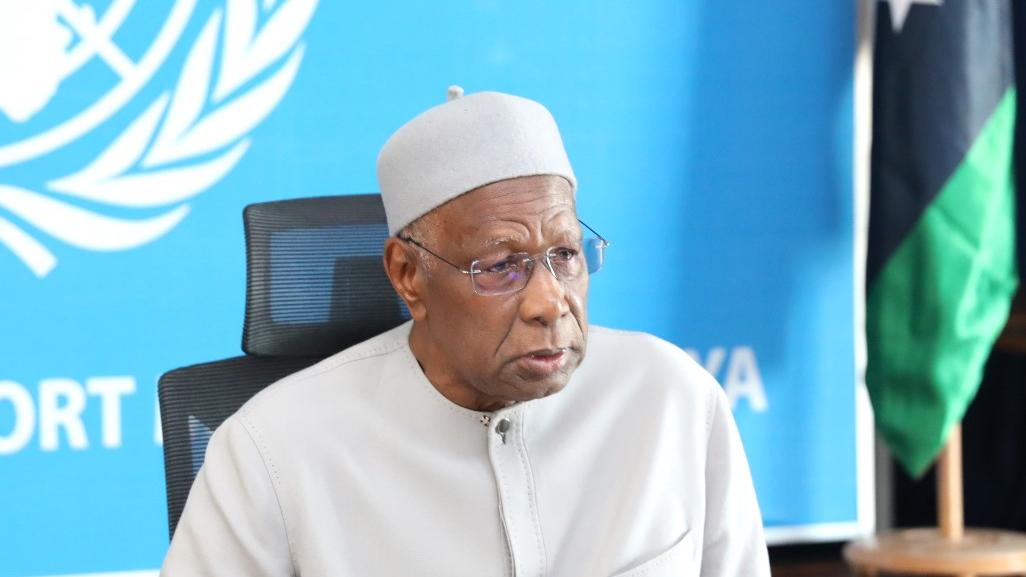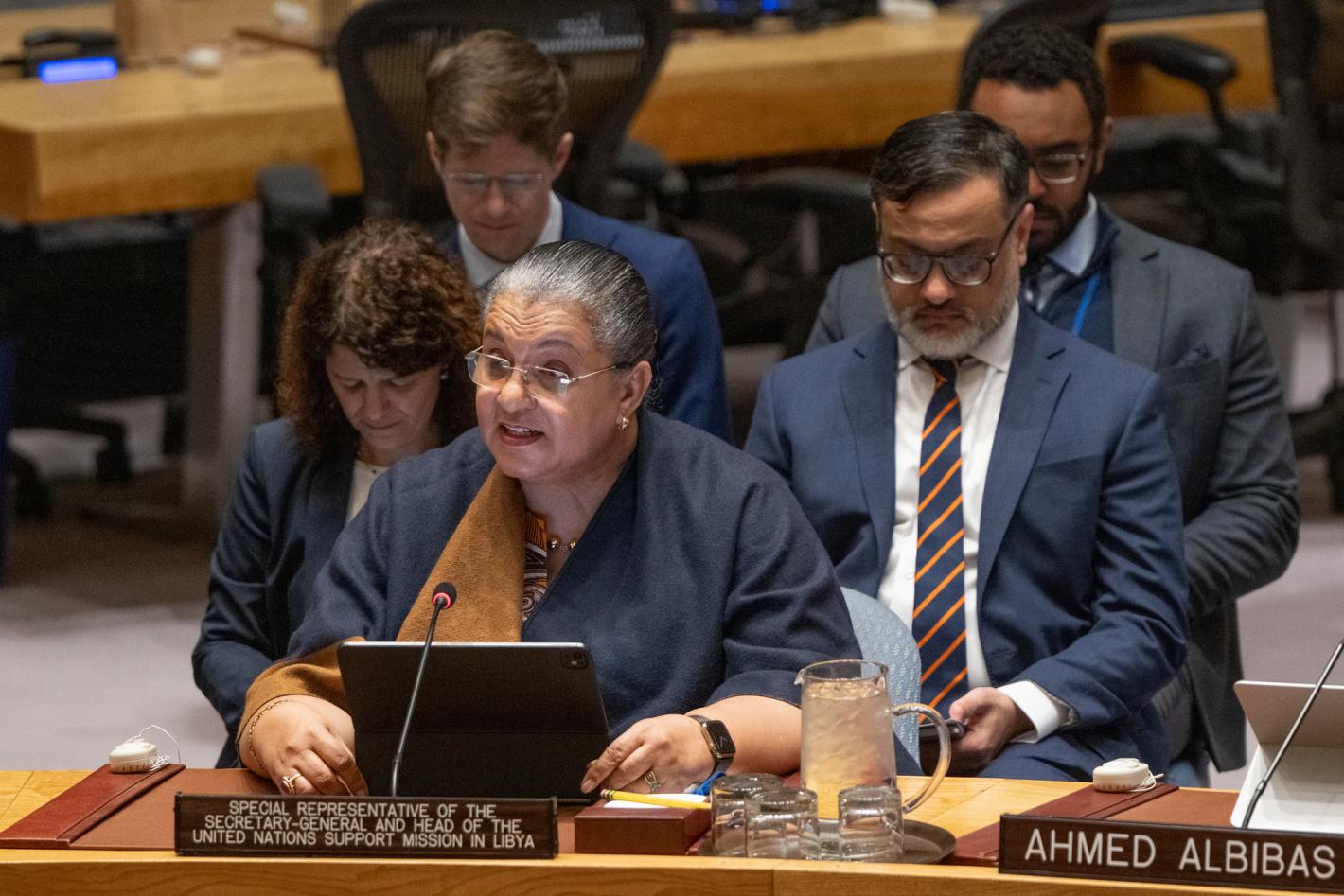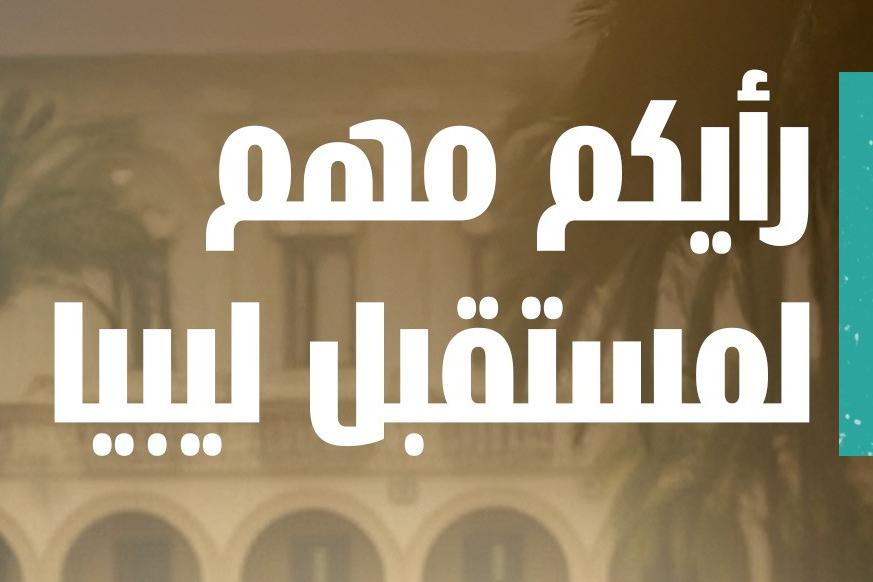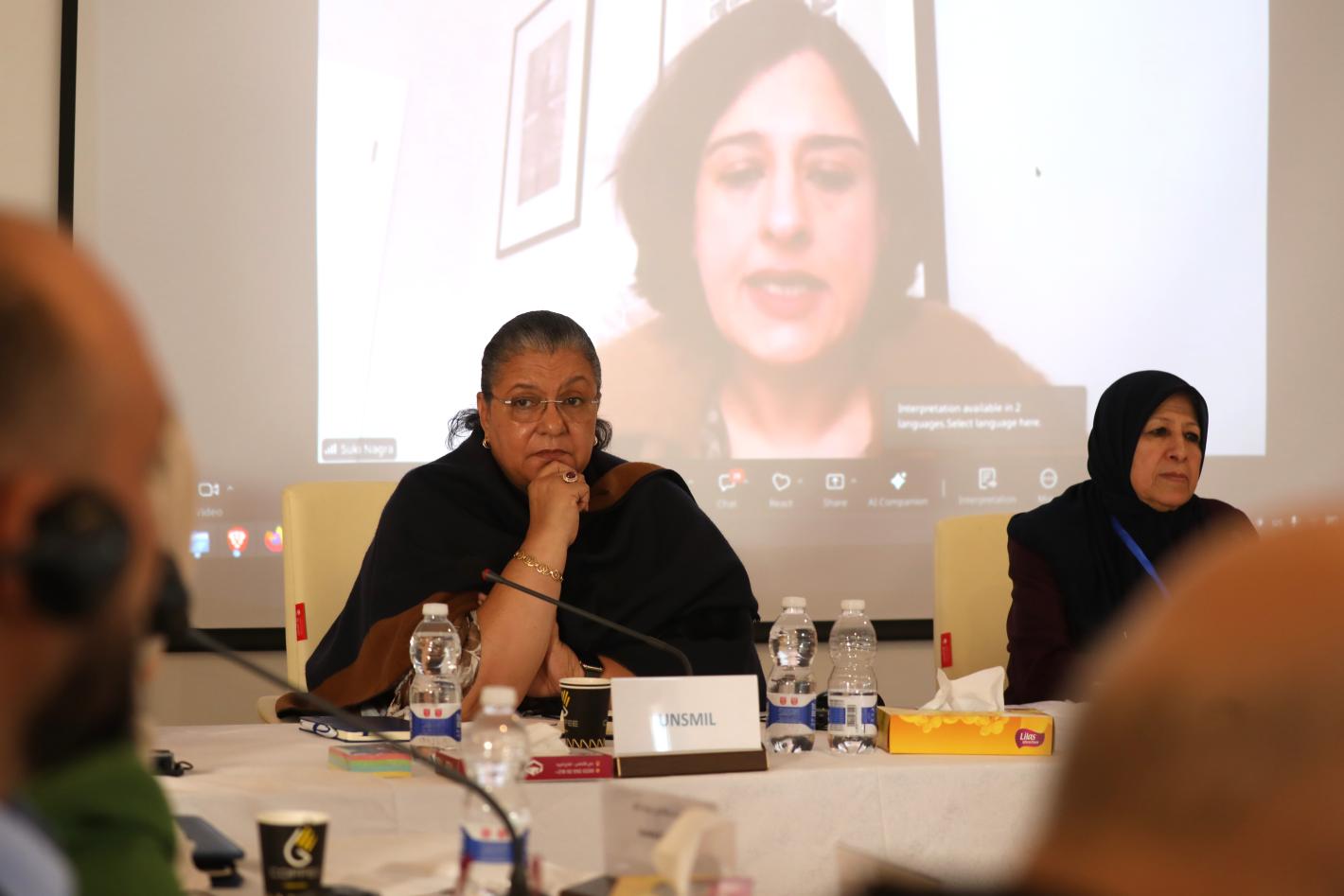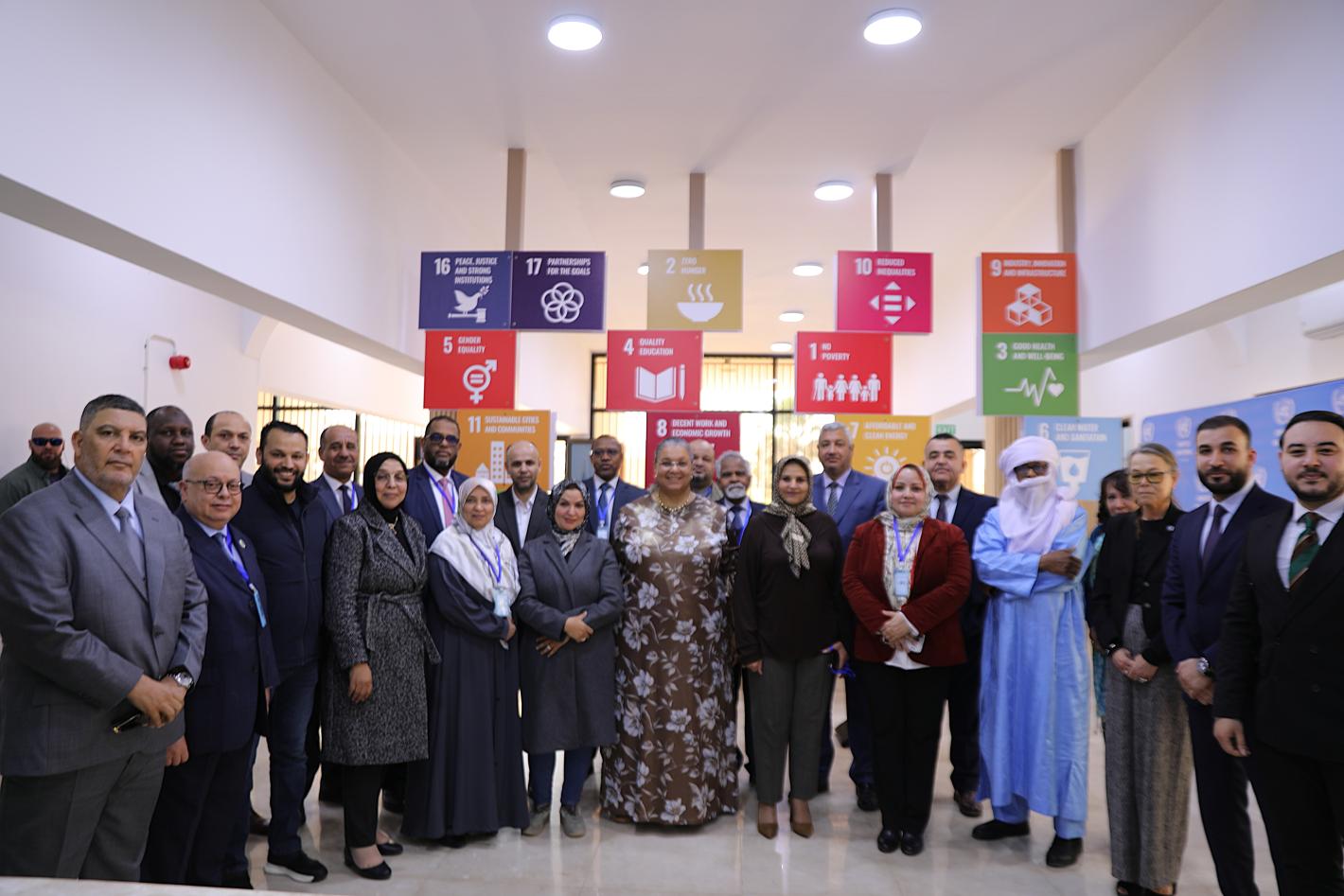السيد الرئيس،
أعضاء مجلس الأمن الموقرين،
يشرفني أن أخاطبكم اليوم للمرة الأولى منذ أن ضربت العاصفة دانيال مدينة درنة والمناطق المحيطة بها في 10 أيلول/ سبتمبر. وأود أن أتقدم بخالص التعازي لجميع الليبيين الذين فقدوا أحباءهم وبيوتهم وسبل عيشهم، إذ لم يسجل تاريخ ليبيا مأساة كالتي شهدتها مدينة درنة. لقد قمت بزيارة المنطقة المتضررة برفقة نائبة الممثل الخاص، المنسقة المقيمة ومنسقة الشؤون الإنسانية، وأعضاء آخرين في فريق قيادة البعثة. إن الخسائر البشرية والمادية التي تسببت بها هذه الكارثة بلغت حداً يتجاوز التصور. وفي بنغازي، قمت بزيارة الأسر النازحة من المدينة المدمرة. وهنا في طرابلس، حضرت أيضاً مراسم عزاء أقامها أقارب المتوفين والمفقودين.
لقد أسفرت هذه الفاجعة عن فقدان آلاف الأرواح. وفي زيارتي إلى مدينة درنة بعد أيام قليلة من العاصفة، رأيت بنفسي هول الكارثة وسمعت من العائلات عن خسائرهم، بينهم أفراد فقدوا جميع أحبائهم. ما رأيته كان مشهداً مروعاً حيث ابتلع الماء أجزاء كبيرة من المدينة. وبغية دعم الأسر والمجتمعات المحلية المتضررة، كانت وكالات الأمم المتحدة والشركاء المحليون والدوليون متواجدين على الأرض خلال ساعات لتقديم المساعدة لإنقاذ الأرواح وإجراء عمليات البحث والإنقاذ.
وبعد حوالي ستة أسابيع من الفيضانات، وصلت المساعدات الإنسانية التي قدمتها أكثر من 24 منظمة إنسانية إلى أكثر من 146,000 شخص ممن هم في حاجة إلى الدعم والخدمات الأساسية. ومع تحول تركيز جهود الاستجابة إلى التعافي المبكر وإعادة الإعمار، أجرت وكالات الأمم المتحدة تقييمات أولية للأضرار والاحتياجات وما تستلزمه المرحلة التالية وذلك بهدف دعم الأهالي في عودة حياتهم إلى طبيعتها في أقرب وقت ممكن.
لقد عكست فاجعة درنة عفوية مشاعر الوحدة والتضامن والتعاطف المثيرة للإعجاب بين الليبيين البسطاء من جميع أنحاء البلاد. وعلى المستوى المؤسسي، أبدى كل من المجلس الرئاسي وحكومة الوحدة الوطنية استعدادهما واستنفرا جهودهما لتقديم الدعم، مثلما فعل مجلس النواب والحكومة المعينة من قبله لتقديم الدعم لعمليات الإنقاذ، كل في حدود صلاحياته.
كما استنفر الجيش الوطني الليبي وحداته وأنشأ غرفة عمليات لدعم أنشطة فرق الإنقاذ. وفي دليل تضامني رائع، انضم أفراد العديد من التشكيلات المسلحة في الغرب إلى زملائهم في الشرق.
وعلى الرغم من غياب التنسيق على الصعيد الوطني بين مختلف المؤسسات، إلا إن تعبئة الجهود من جانب كل منها بشكل فردي بعد وقوع الفاجعة مباشرة خلق حالة من الزخم الوطني للوحدة مستوحى من هذه الكارثة.
السيد الرئيس،
أود أن أثني على شركاء ليبيا الدوليين من المنطقة وغيرها على دعمهم العاجل والناجع للشعب الليبي عقب هذه الفاجعة.
فقد كشفت كارثة درنة العجز الكبير في الحوكمة وذلك من خلال عدد من الإشكاليات كانعدام الصيانة لمنظومات السدود وغياب إدارة الموارد فضلاً عن الافتقار إلى آلية ناجعة لإدارة الكوارث الطبيعية والوقاية منها. وعلى رأس هذه الإشكاليات يأتي غياب القرار السياسي الموحد على المستوى الوطني مما زاد الطين بلّة وجعل الأمور أكثر صعوبة. ولو كانت إشكاليات الحوكمة هذه قد حُلّت على الصعيد الوطني، لكانت خففت من هول الفاجعة.
السيد الرئيس،
يساورني قلق كبير إزاء الانقسام الحاصل بين القيادات في ليبيا حول إعادة إعمار مدينة درنة وضواحيها. فالقيادات ما تزال حتى اللحظة تتصارع وتتزاحم على من ستكون له السلطة الحصرية على جهود إعادة الإعمار، وهناك مبادرات مختلفة من شرق البلاد وغربها بهذا الخصوص. ومنذ البداية، دعت البعثة القيادات إلى تأسيس آلية وطنية موحدة لتقييم حجم الأضرار وتنفيذ مشروع إعادة الإعمار حيث ستتم تغطية تكلفته في الغالب من الموارد الوطنية الليبية.
وقد أعرب غالبية الشركاء الدوليين عن استعدادهم لدعم مثل هذه الآلية الوطنية كأداة للشفافية والمساءلة والكفاءة. فالمبادرات التي تفتقر للتنسيق قد تسبب المزيد من خيبات الأمل لأهالي درنة وللشعب الليبي الذي يتوق لتعافٍ عاجل وإعادة إعمار فاعلة للمناطق المنكوبة.
السيد الرئيس،
أعضاء مجلس الأمن الموقرين،
يسعدني أن أعلن بأن العملية الانتخابية قد شهدت بعض التقدم. فقد أكملت لجنة (6+6) عملها في مطلع شهر تشرين الأول/ أكتوبر. وعلى الرغم من الضغوطات الهائلة والمداولات المضنية في مدينة بوزنيقة في المملكة المغربية وكذلك في طرابلس وبنغازي ومدن أخرى في ليبيا، توصل أعضاء هذه اللجنة إلى حلول وسط بشأن العديد من القضايا الخلافية. وأصدر مجلس النواب القانونين المنظمين للانتخابات في 5 تشرين الأول/ أكتوبر وتسلمتهما المفوضية الوطنية العليا للانتخابات بشكل رسمي في 9 تشرين الأول/ أكتوبر.
وتثني البعثة على جهود اللجنة وترحب بالتقدم الذي أحرزته.
السيد الرئيس،
يتذكر هذا المجلس بأن البعثة قد دأبت على المطالبة بقوانين انتخابية قابلة للتنفيذ من الناحية الفنية والسياسية. وعلى ضوء ذلك، فإن قانوني الانتخابات الجديدين يسترعيان عدداً من الملاحظات:
من المنظور الفني، تحسّن القانونان المنقحان مقارنة بالمسودتين السابقتين بعد معالجتهما لبعض النقاط المقلقة التي حددتها كل من المفوضية والبعثة. ومنها، بين جملة من النقاط الأخرى، شروط الانتخاب للعسكريين، والوضوح بشأن تسلسل الانتخابات، والوضوح بشأن توزيع مقاعد مجلس الشيوخ ومجلس النواب والوضوح بشأن آلية فض المنازعات الانتخابية.
من المنظور السياسي، ما تزال القضايا الأكثر إثارة للجدل السياسي والتي أبرزتها في إحاطتي لشهري حزيران/ يونيو وآب/ أغسطس بلا حل، وأبرزها:
أ- الجولة الثانية الإلزامية للانتخابات الرئاسية: خلافاً للممارسة المتعارف عليها، يتطلب هذا النص من المرشحَين الأوفر حظاً في الانتخابات الرئاسية خوض جولة الإعادة، بغض النظر عن الأصوات التي حصلا عليها. وهذا مرتبط بشروط الترشح ويبين عمق انعدام الثقة بين الطبقة السياسية. ومن الممكن أن يُساء استخدامه لاستبعاد المرشحين من الجولة الثانية، والتشكيك في نتيجة الأغلبية المحتملة وتعطيل العملية الانتخابية برمتها.
ب- الربط بين الانتخابات الرئاسية والبرلمانية: بينما يمكن إجراء الانتخابات الرئاسية والتشريعية في نفس اليوم، فإن إخضاع صحة الانتخابات البرلمانية لصحة الانتخابات الرئاسية ناجم عن اعتبارات سياسية غير معلنة ويعرّض العملية لخطر التعطيل.
ج- تشكيل "حكومة جديدة": وهي قضية خلافية إلى حد كبير، فالحكومة الجديدة لا يمكن أن تأتي إلا نتيجة تفاوض بين أصحاب الشأن الرئيسيين. فضلاً عن ذلك، من المنطقي أن إتاحة فرص متكافئة لجميع المرشحين يستلزم حكومة موحدة تتمتع بثقة الشعب لقيادة البلاد إلى الانتخابات. مع ذلك، ولتلافي تكرار أزمة آب/ أغسطس 2022 التي اندلعت بسبب تكليف حكومة السيد فتحي باشاغا على نحو أحادي الجانب، لا مناص من أن تكون هذه الحكومة نتاج مفاوضات سياسية بين الأطراف الرئيسية.
حذف المواد التي تسمح لحاملي الأرقام الإدارية بالتسجيل والتصويت - والتي كانت مدرجة في نسخة حزيران/ يونيو من مشروع القوانين الانتخابية - قد يزيد من التحديات التي تواجه تنفيذ الانتخابات في جنوب البلاد ويحد من شمول الانتخابات.
ومما يؤسف له أن الأحكام المتعلقة بالجنسين في انتخابات مجلس الشيوخ بقيت هي الأخرى دون تغيير، حيث تم تخصيص 6 مقاعد فقط (6.6 بالمائة) للنساء من أصل 90 مقعداً.
تنص القوانين الانتخابية على أن الانتخابات ينبغي أن تُجرى خلال 240 يوماً من دخولها حيز التنفيذ. غير أن المفوضية الوطنية العليا للانتخابات أبلغت البعثة أن تنفيذ القوانين الانتخابية لن يبدأ إلا بعد حل مسألة "الحكومة الجديدة“، وذلك تمشياً مع المادة (86) من قانون الانتخابات الرئاسية والمادة (90) من قانون مجلس الأمة.
وأخيراً، هنالك خلافات بين مجلس النواب والمجلس الأعلى للدولة حول القوانين الانتخابية، حيث يعترض المجلس الأعلى للدولة على التعديلات التي أدخلت على القوانين الانتخابية التي أقرها مجلس النواب ويصر على أن نسخة بوزنيقة هي التي ينبغي أن تُعتمد. إن رفض المجلس الأعلى للدولة للتعديلات التي أدخلتها لجنة (6+6) بعد بوزنيقة يشكل خياراً سياسياً يعرّض للخطر كل المكاسب التي حققها المجلسان والحلول الوسط التي توصلا إليها بشق الأنفس.
السيد الرئيس،
أعضاء مجلس الأمن الموقرين،
في طرابلس، عاد الهدوء الحذر والهش ليعم من جديد رغم استمرار أوجه التوتر بين التشكيلات المسلحة التي تتخذ من طرابلس مقراً لها. إن الاضطراب المتأصل للديناميات بين هؤلاء الفاعلين الأمنيين تؤكد الحاجة الماسة إلى عملية سياسية شاملة للجميع.
وفي بنغازي، أدت محاولات الجيش الوطني الليبي لتوقيف وزير الدفاع الأسبق بحكومة الوفاق الوطني، مهدي البرغثي، إلى اشتباكات مسلحة في مناطق آهلة بالسكان المدنيين. وبين 6 و8 تشرين الأول/ أكتوبر تسبب القتال في وقوع عدد من الضحايا وخسائر مادية وإغلاق لأنظمة الاتصالات استمر حوالي أسبوع. وبفضل تدخل قادة المجتمع المحلي، هدأت النمو في الوقت الراهن.
وهنا أناشد الجميع بخفض التصعيد من خلال الحوار ووضع مبادئ حماية المدنيين في صميم العمليات الدائرة.
السيد الرئيس،
ما تزال حالة حقوق الإنسان مبعث قلق مع استمرار الاعتداءات على الفضاء المدني وسيادة القانون مما يسهم في تدهور الوضع العام. كما تم تسجيل حالات اعتقال واحتجاز تعسفي، بما فيها تلك التي طالت أعضاء في الأحزاب السياسية ومراكز بحثية. كما يساورني الانشغال أيضاً حيال عمليات الترحيل الممنهج والطرد الجماعي للمهاجرين وطالبي اللجوء من تونس إلى ليبيا، وهم في أمس الحاجة إلى الحماية الدولية.
السيد الرئيس،
أود أن أثني على الدور الإيجابي والمسؤولية الأخلاقية التي تحلى بها زعماء القبائل في نزع فتيل التوترات في جميع أنحاء ليبيا خلال أحداث طرابلس في آب/ أغسطس الماضي وفي بنغازي الأسبوع المنصرم، وأدعوهم إلى تعزيز دورهم كعناصر فاعلة في مجال السلام والمصالحة الوطنية.
أعضاء المجلس الموقرين،
ختاماً، إن استكمال لجنة (6+6) للقوانين الانتخابية يتيح فرصة لكسر الجمود الحالي في ليبيا على الرغم من القضايا المتبقية التي ينبغي ضبطها والاتفاق عليها من خلال تسوية سياسية بين أصحاب الشأن الرئيسيين.
ومع ذلك، فإن رفض المجلس الأعلى للدولة للتعديلات التي أدخلتها لجنة (6+6) بعد بوزنيقة يشكل خياراً سياسياً يعرض للخطر المكاسب التي حققها المجلسان بشق الأنفس. لذا فإنني أدعو المجلس الأعلى للدولة إلى التخلي عن هذا الموقف الذي يهدد بعرقلة العملية الانتخابية.
إن الجدل الدائر بين مجلس النواب والمجلس الأعلى للدولة حول القوانين بالإضافة إلى قضية "الحكومة الجديدة“، وهي محل خلاف شديد، والربط بين الانتخابات الرئاسية والبرلمانية، واحتمالية إساءة استخدام الاشتراطات المرتبطة بالجولة الثانية الإلزامية للانتخابات الرئاسية، يعرّض العملية الانتخابية برمتها لخطر أزمة سياسية أخرى، مما قد يؤدي إلى تكرار سيناريو كانون الأول/ ديسمبر 2021 أو أزمة آب/ أغسطس 2022.
وفي هذا الصدد، وتساوقاً مع ولاية بعثة الأمم المتحدة للدعم في ليبيا فيما يخص منع نشوب النزاعات، أود أن أنبهكم إلى خطر اندلاع نزاع قد يتسم بالعنف إذا تم الإقدام على تسمية حكومة على نحو أحادي الجانب من قبل أي من الأطراف المتنافسة. وأدعو هذا المجلس إلى استخدام نفوذه لمنع هذا الانزلاق الخطير وتعبئة الأطراف الليبية للدخول في حوار.
منذ إحاطتي الأخيرة، تحاورت مع الأطراف الرئيسية على مستوى المؤسسات، وكذلك مع الليبيين من جميع مناحي الحياة لتشجيعهم على إبداء الإرادة الصادقة وحسن النية من أجل نجاح العملية الانتخابية. إن الالتزام الحقيقي من جانب الجميع بخدمة مصلحة الشعب لتحقيق السلام والاستقرار والرخاء هو وحده الذي يمكن أن يؤدي إلى نتيجة إيجابية للانتخابات.
فالقوانين لوحدها لا ولن تملك القدرة على جعل الانتخابات واقعاً. إذ يجب دعمها من خلال القبول بها من جانب طيف واسع من الأطراف المعنية، بما في ذلك المؤسسات الرئيسية، بل وأيضاً الجهات العسكرية والأمنية والأحزاب السياسية والمرشحين وقادة المجتمع ومنظمات المجتمع المدني ومجموعات النساء والشباب والإعلاميين وغيرهم من المكونات.
وهنا أدعو أصحاب الشأن جميعهم، بمن فيهم القادة الرئيسيين، إلى الاجتماع والاتفاق على تسوية سياسية ملزمة نحو عملية انتخابية سلمية، يكون عمادها حكومة موحدة لقيادة ليبيا إلى الانتخابات. وبعثة الأمم المتحدة للدعم في ليبيا على استعداد لتيسير هذه العملية.
وفي النهاية، أكرر دعوتي لجميع شركاء ليبيا الدوليين لدعم العملية الانتخابية هذه باعتبارها السبيل الوحيد لمنح البلاد مؤسسات شرعية ومستقبل من السلام والوحدة والاستقرار والازدهار، وهو مآل طال انتظاره من المواطنين الليبيين التواقين لطي صفحة الصراع ودرء مخاطر تفكك بلادهم. إن استمرار الأزمات في السودان والساحل والمنطقة برمتها وآثاره غير المباشرة المحتملة على ليبيا يشكل تهديدات جسيمة يجب عدم الاستخفاف بها.
شكراً لكم.


